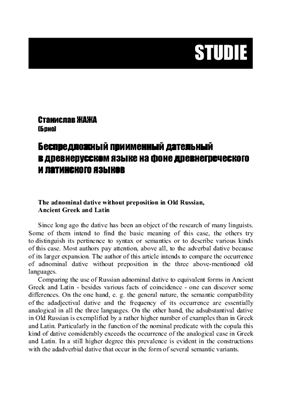New Russian Studies (1/2008). 6-19 p.
Since long ago the dative has been an object of the research of many linguists. Some of them intend to find the basic meaning of this case, the others try to distinguish its pertinence to syntax or semantics or to describe various kinds of this case. Most authors pay attention, above all, to the adverbal dative because of its larger expansion. The author of this article intends to compare the occurrence of adnominal dative without preposition in the three above-mentioned old languages.
Comparing the use of Russian adnominal dative to equivalent forms in Ancient Greek and Latin - besides various facts of coincidence - one can discover some differences. On the one hand, e. g. the general nature, the semantic compatibility of the adadjectival dative and the frequency of its occurrence are essentially analogical in all the three languages. On the other hand, the adsubstantival dative in Old Russian is exemplified by a rather higher number of examples than in Greek and Latin. Particularly in the function of the nominal predicate with the copula this kind of dative considerably exceeds the occurrence of the analogical case in Greek and Latin. In a still higher degree this prevalence is evident in the constructions with the adadverbial dative that occur in the form of several semantic variants.
Since long ago the dative has been an object of the research of many linguists. Some of them intend to find the basic meaning of this case, the others try to distinguish its pertinence to syntax or semantics or to describe various kinds of this case. Most authors pay attention, above all, to the adverbal dative because of its larger expansion. The author of this article intends to compare the occurrence of adnominal dative without preposition in the three above-mentioned old languages.
Comparing the use of Russian adnominal dative to equivalent forms in Ancient Greek and Latin - besides various facts of coincidence - one can discover some differences. On the one hand, e. g. the general nature, the semantic compatibility of the adadjectival dative and the frequency of its occurrence are essentially analogical in all the three languages. On the other hand, the adsubstantival dative in Old Russian is exemplified by a rather higher number of examples than in Greek and Latin. Particularly in the function of the nominal predicate with the copula this kind of dative considerably exceeds the occurrence of the analogical case in Greek and Latin. In a still higher degree this prevalence is evident in the constructions with the adadverbial dative that occur in the form of several semantic variants.

